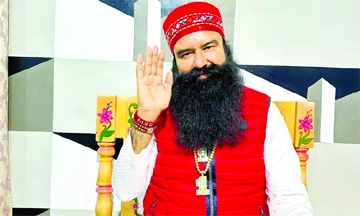New Delhi (TIP)- The Supreme Court on Friday, October 18, revived the trial against Gurmeet Ram Rahim, head of the Sirsa-based Dera Sacha Sauda, in the 2015 sacrilege cases as it stayed the March order by the Punjab and Haryana high court that had halted proceedings in three criminal cases related to the incident.
A bench led by justice Bhushan R Gavai stayed the HC’s March 11 order, responding to an appeal by the Punjab government. The state questioned the high court’s approach in reviving a legal issue previously settled by the high court itself.
The controversy stems from the Punjab government’s September 2018 notification withdrawing consent for the Central Bureau of Investigation (CBI) to investigate the cases, which were handed over to a special investigation team (SIT) of the state police. Ram Rahim had challenged this notification in the high court, demanding that the CBI continue its probe into the three sacrilege FIRs from 2015.
Punjab advocate general Gurminder Singh cited a January 2019 high court ruling that upheld the state’s authority to withdraw CBI consent. “How can the HC ignore the order passed by a coordinate bench,” the Supreme Court bench, which included Justice KV Viswanathan, asked on Friday.
The court issued a notice on the state’s appeal and granted Ram Rahim four weeks to respond. “In the meantime, there shall be a stay of the impugned [HC] order,” the bench stated, adjourning the matter for November 19.
In February last year, the SC had transferred the trial against Ram Rahim and seven followers in three interlinked cases of Bargari sacrilege from a court in Faridkot to Chandigarh. The move came after dera follower Pardeep Singh Kataria, an accused in the 2015 Bargari sacrilege case, was shot dead on November 10, 2022, and other accused moved the apex court seeking transfer of the case.
The sacrilege incidents began on June 1, 2015, when a copy of the Guru Granth Sahib was stolen from a gurdwara in Burj Jawahar Singh Wala village. Subsequently, three derogatory posters threatening sacrilege were found in Bargari and Burj Jawahar Singh Wala villages. On 12 October 2015, torn pages of the Sikh holy book were found scattered near a gurdwara in Bargari village.
These events sparked outrage across Punjab, leading to protests. Two demonstrators died and several were injured in subsequent police action. The incident’s mishandling contributed to the Shiromani Akali Dal government’s defeat in the 2017 assembly elections.
The SIT formed by the state concluded that the desecration was orchestrated at the Dera Sacha Sauda headquarters with Ram Rahim’s involvement. The SIT’s final report, submitted in April 2022, found no political involvement but alleged that Ram Rahim ordered the sacrilege as revenge for a perceived insult to sect followers by a Sikh preacher.
The SIT has filed chargesheets against Ram Rahim in the three cases, naming him the ‘main conspirator’. However, the state government is yet to grant prosecution sanction, with the proposal pending with the state home department.
Dera chief to face trial in sacrilege cases as SC lifts HC stay
